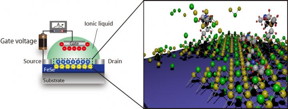Home > Press > Electrochemical etching down to one-monolayer towards high-Tc superconductivity: A new route for exploration of nontrivial physical phenomena at two-dimensional materials
 |
| (Left) Device structure of electric-double-layer transistor with FeSe channel deposited on oxide substrate. (Right) One-monolayer FeSe is realized by electrochemical etching where Fe and Se ions are dissolved into ionic liquid. CREDIT: Junichi Shiogai |
Abstract:
Iron selenide (FeSe) is an attracting superconducting material since the superconducting transition temperature (Tc) is enhanced from 8 K in bulk form toward 65 K in one-monolayer form.
Electrochemical etching down to one-monolayer towards high-Tc superconductivity: A new route for exploration of nontrivial physical phenomena at two-dimensional materials
Sendai, Japan | Posted on November 4th, 2015However, systematic thickness dependence of electrical measurement has been difficult to address.
A team of researchers at Tohoku University's Institute for Materials Research (IMR), has realized layer-by-layer etching in superconducting FeSe films down to approximately one-monolayer about 0.6 nm using classical electrochemical reaction in electric-double-layer transistor configuration.
As the thickness of the films becomes thin, the superconducting transition temperature (Tc) is increased from bulk value (8 K) to about 40 K. In addition, the research group unveils that by combining with an electrostatic charging effect, the high-Tc transition can be induced in 10-nm thick condition (20 monolayers), which had been limited in one/two-monolayers so far.
The development of this etching technique will pave the way for the exploration of nontrivial physical phenomena in atomically thin two-dimensional films. This had previously been difficult to address by conventional methods.
This work was published in Nature Physics online on Nov 2, 2015.
###
Publication Information
Authors: J. Shiogai, Y. Ito, T. Mitsuhashi, T. Nojima and A. Tsukazaki
Title: Electric-field-induced superconductivity in electrochemically etched ultrathin FeSe films on SrTiO3 and MgO
Journal: Nature Physics
####
For more information, please click here
Contacts:
Junichi Shiogai
Copyright © Tohoku University
If you have a comment, please Contact us.Issuers of news releases, not 7th Wave, Inc. or Nanotechnology Now, are solely responsible for the accuracy of the content.
| Related News Press |
News and information
![]() Researchers develop molecular qubits that communicate at telecom frequencies October 3rd, 2025
Researchers develop molecular qubits that communicate at telecom frequencies October 3rd, 2025
![]() Next-generation quantum communication October 3rd, 2025
Next-generation quantum communication October 3rd, 2025
![]() "Nanoreactor" cage uses visible light for catalytic and ultra-selective cross-cycloadditions October 3rd, 2025
"Nanoreactor" cage uses visible light for catalytic and ultra-selective cross-cycloadditions October 3rd, 2025
Superconductivity
Physics
![]() Quantum computers simulate fundamental physics: shedding light on the building blocks of nature June 6th, 2025
Quantum computers simulate fundamental physics: shedding light on the building blocks of nature June 6th, 2025
![]() A 1960s idea inspires NBI researchers to study hitherto inaccessible quantum states June 6th, 2025
A 1960s idea inspires NBI researchers to study hitherto inaccessible quantum states June 6th, 2025
![]() Magnetism in new exotic material opens the way for robust quantum computers June 4th, 2025
Magnetism in new exotic material opens the way for robust quantum computers June 4th, 2025
Thin films
![]() Utilizing palladium for addressing contact issues of buried oxide thin film transistors April 5th, 2024
Utilizing palladium for addressing contact issues of buried oxide thin film transistors April 5th, 2024
![]() Understanding the mechanism of non-uniform formation of diamond film on tools: Paving the way to a dry process with less environmental impact March 24th, 2023
Understanding the mechanism of non-uniform formation of diamond film on tools: Paving the way to a dry process with less environmental impact March 24th, 2023
![]() New study introduces the best graphite films: The work by Distinguished Professor Feng Ding at UNIST has been published in the October 2022 issue of Nature Nanotechnology November 4th, 2022
New study introduces the best graphite films: The work by Distinguished Professor Feng Ding at UNIST has been published in the October 2022 issue of Nature Nanotechnology November 4th, 2022
![]() Thin-film, high-frequency antenna array offers new flexibility for wireless communications November 5th, 2021
Thin-film, high-frequency antenna array offers new flexibility for wireless communications November 5th, 2021
Discoveries
![]() Researchers develop molecular qubits that communicate at telecom frequencies October 3rd, 2025
Researchers develop molecular qubits that communicate at telecom frequencies October 3rd, 2025
![]() Next-generation quantum communication October 3rd, 2025
Next-generation quantum communication October 3rd, 2025
![]() "Nanoreactor" cage uses visible light for catalytic and ultra-selective cross-cycloadditions October 3rd, 2025
"Nanoreactor" cage uses visible light for catalytic and ultra-selective cross-cycloadditions October 3rd, 2025
Announcements
![]() Rice membrane extracts lithium from brines with greater speed, less waste October 3rd, 2025
Rice membrane extracts lithium from brines with greater speed, less waste October 3rd, 2025
![]() Researchers develop molecular qubits that communicate at telecom frequencies October 3rd, 2025
Researchers develop molecular qubits that communicate at telecom frequencies October 3rd, 2025
![]() Next-generation quantum communication October 3rd, 2025
Next-generation quantum communication October 3rd, 2025
![]() "Nanoreactor" cage uses visible light for catalytic and ultra-selective cross-cycloadditions October 3rd, 2025
"Nanoreactor" cage uses visible light for catalytic and ultra-selective cross-cycloadditions October 3rd, 2025
Interviews/Book Reviews/Essays/Reports/Podcasts/Journals/White papers/Posters
![]() Spinel-type sulfide semiconductors to operate the next-generation LEDs and solar cells For solar-cell absorbers and green-LED source October 3rd, 2025
Spinel-type sulfide semiconductors to operate the next-generation LEDs and solar cells For solar-cell absorbers and green-LED source October 3rd, 2025
![]() Rice membrane extracts lithium from brines with greater speed, less waste October 3rd, 2025
Rice membrane extracts lithium from brines with greater speed, less waste October 3rd, 2025
|
|
||
|
|
||
| The latest news from around the world, FREE | ||
|
|
||
|
|
||
| Premium Products | ||
|
|
||
|
Only the news you want to read!
Learn More |
||
|
|
||
|
Full-service, expert consulting
Learn More |
||
|
|
||








